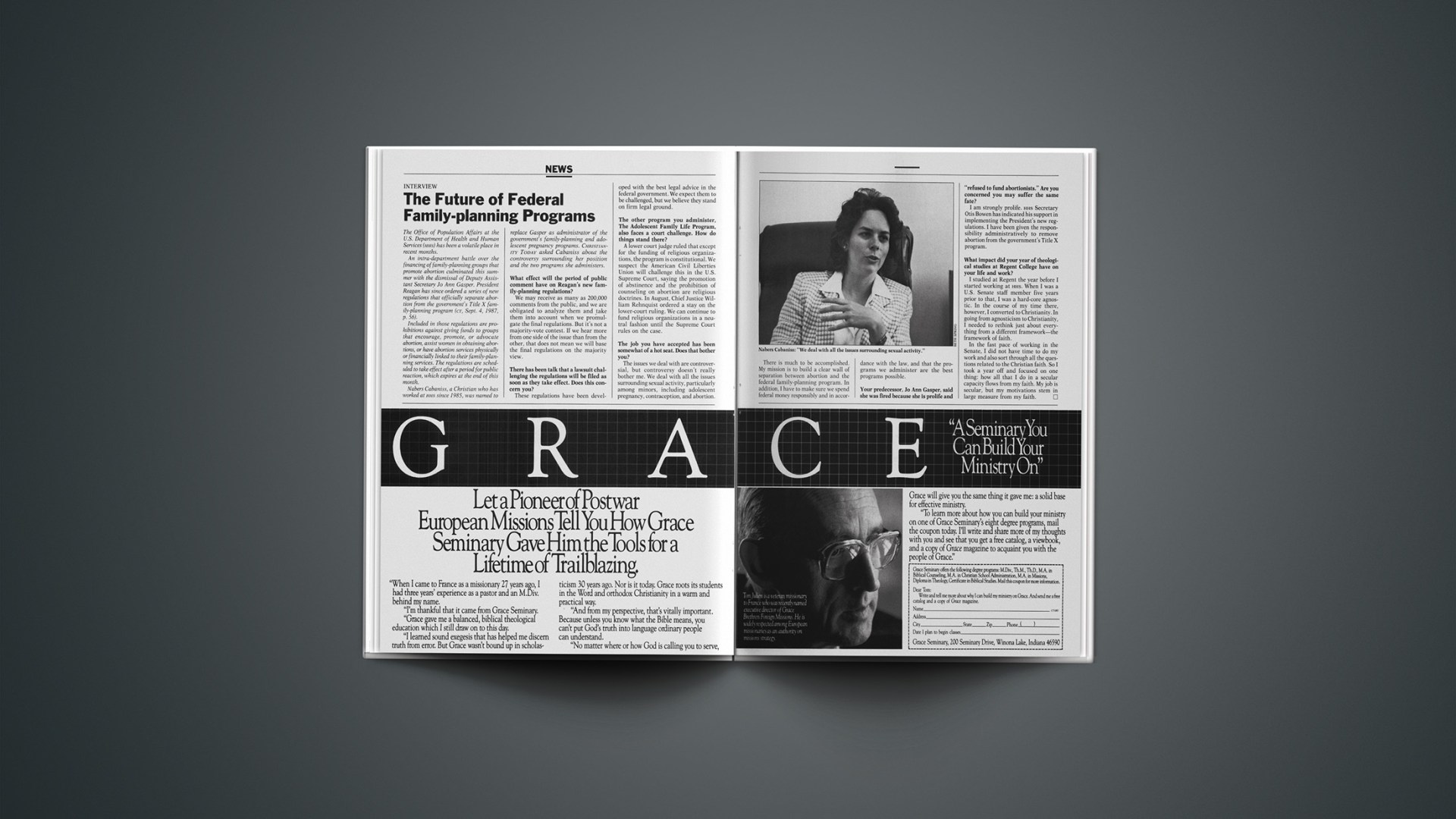The Office of Population Affairs at the U.S. Department of Health and Human Services (HHS) has been a volatile place in recent months.
An intra-department battle over the financing of family-planning groups that promote abortion culminated this summer with the dismissal of Deputy Assistant Secretary Jo Ann Gasper. President Reagan has since ordered a series of new regulations that officially separate abortion from the government’s Title X family-planning program (CT, Sept. 4, 1987, p. 56).
Included in those regulations are prohibitions against giving funds to groups that encourage, promote, or advocate abortion, assist women in obtaining abortions, or have abortion services physically or financially linked to their family-planning services. The regulations are scheduled to take effect after a period for public reaction, which expires at the end of this month.
Nabers Cabaniss, a Christian who has worked at HHS since 1985, was named to replace Gasper as administrator of the government’s family-planning and adolescent pregnancy programs. CHRISTIANITY TODAY asked Cabaniss about the controversy surrounding her position and the two programs she administers.
What effect will the period of public comment have on Reagan’s new family-planning regulations?
We may receive as many as 200,000 comments from the public, and we are obligated to analyze them and take them into account when we promulgate the final regulations. But it’s not a majority-vote contest. If we hear more from one side of the issue than from the other, that does not mean we will base the final regulations on the majority view.
There has been talk that a lawsuit challenging the regulations will be filed as soon as they take effect. Does this concern you?
These regulations have been developed with the best legal advice in the federal government. We expect them to be challenged, but we believe they stand on firm legal ground.
The other program you administer, The Adolescent Family Life Program, also faces a court challenge. How do things stand there?
A lower court judge ruled that except for the funding of religious organizations, the program is constitutional. We suspect the American Civil Liberties Union will challenge this in the U.S. Supreme Court, saying the promotion of abstinence and the prohibition of counseling on abortion are religious doctrines. In August, Chief Justice William Rehnquist ordered a stay on the lower-court ruling. We can continue to fund religious organizations in a neutral fashion until the Supreme Court rules on the case.
The job you have accepted has been somewhat of a hot seat. Does that bother you?
The issues we deal with are controversial, but controversy doesn’t really bother me. We deal with all the issues surrounding sexual activity, particularly among minors, including adolescent pregnancy, contraception, and abortion.
There is much to be accomplished. My mission is to build a clear wall of separation between abortion and the federal family-planning program. In addition, I have to make sure we spend federal money responsibly and in accordance with the law, and that the programs we administer are the best programs possible.
Your predecessor, Jo Ann Gasper, said she was fired because she is prolife and “refused to fund abortionists.” Are you concerned you may suffer the same fate?
I am strongly prolife. HHS Secretary Otis Bowen has indicated his support in implementing the President’s new regulations. I have been given the responsibility administratively to remove abortion from the government’s Title X program.
What impact did your year of theological studies at Regent College have on your life and work?
I studied at Regent the year before I started working at HHS. When I was a U.S. Senate staff member five years prior to that, I was a hard-core agnostic. In the course of my time there, however, I converted to Christianity. In going from agnosticism to Christianity, I needed to rethink just about everything from a different framework—the framework of faith.
In the fast pace of working in the Senate, I did not have time to do my work and also sort through all the questions related to the Christian faith. So I took a year off and focused on one thing: how all that I do in a secular capacity flows from my faith. My job is secular, but my motivations stem in large measure from my faith.










